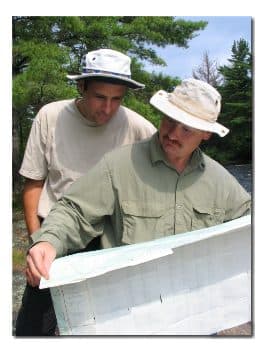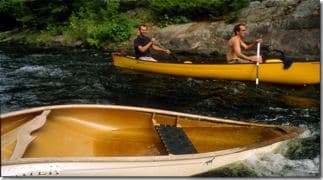Trip Planning
I'm so excited. It's that special time of the year now where my regular canoe mates gather on a regular basis to plan this coming season's trips. We call the meetings "Map and Flaps" and meet the same night my canoe partner's wife gathers together with her "Stitch and Bitch" club. It's usually held on a Wednesday evening and hosted by the proclaimed leader of the so-called expedition. It begins with a show-and-tell of all the new gear purchased for the upcoming season, with each item being heavily scrutinized and debated over. Then all the maps and relevant guide books are spread out or displayed on the kitchen table and route choices discussed. Arguments begin to erupt almost immediately of course, usually due to the fact that each member has a totally different reason for tagging along.

The squabbling continues when the host serves samples of new camp recipes, none of which taste as good as last years. By the time dessert is served, and washed down with a generous amount of rum, the route has been altered, the length has been changed, the scheduled date has been rescheduled, and somehow a couple of new members have been added on the list without the consent from half the group. It's obvious at this point that the trip is destined to fail.
My regular companions know this scenario all too well. For the last fourteen years we've met in mid-winter to plan our spring outing. For the first few years it was disastrous. We constantly argued over where we were going, how we were going to get there, who was going, and, most important, why we were going in the first place. However, we've now changed our ways. Our pre-trip planning party now has some strict rules applied to it, and we make darn sure they're seriously followed. Our trips, of course, still have their problems. But at least we can't blame poor planning.
Rules and Regulation:
- Who is going is definitely the first thing decided upon since everything else has a direct bearing on it. Group dynamics is number one. When choosing the crew, always lean toward skill and the ability to communicate with the other team members rather than going with the age-old friendship thing. Obviously, friendship is one of the reasons groups go out together in the first place. But not having the proper skills, friends or not, can get you into some real jams out there.
- The group should consist of at least four but no more than six people. Any less and it's not a safe trip. Any more and you're just asking for compatibility problems (not to mention being unable to find a large enough campsite).
- Selecting gear (who is bringing what) is carefully planned out. And remember, no belittling someone else's new gear during show-and-tell. If you do happen to make fun of the gear you are definitely not permitted to borrow it while out on the trip.
- Members are split up into small cooking groups (two or three). For each meal, the team leader taste-tests the individual recipes, and the group with the worst meal does the dishes and the group with the best meal gets to tease the losers unmercifully while they're doing the dishes.
- Cooking groups share items such as a tent or a canoe. However, each member must be self sufficient when it comes to everything else. Borrowing items, such as toilet paper, is strictly forbidden.
- The route chosen best depicts, as much as possible, the group's general "trip philosophy." Are we going for a real adventure or just to relax? Do we want to fish along the way or travel as much as possible? Is there a rest day planned half way through or a side trip added on? Will it be a circular route or a linear trip which required a car shuttle? Having everyone agreeing is next too impossible of course. The important thing, however, is that you've tried to at least accommodate everyone's needs. This process will help control the frustration (and reduce the blame) when something goes wrong - and something will definitely go wrong.
- A trip leader is chosen and agreed upon by all members of the group, as well as the leader themselves. The voyageurs always had a trip leader, titled the "Bourgeois," who made all the important decisions and good judgment and fair consensus, especially between groups of friends, can be easily swayed by fatigue or bravado. A trip leader can quickly solve this issue. Or, at best, be the one to complain to.
- Each crew member is given a separate task or duty so the leader knows who to blame when it's not properly done, or not done at all.
- Once the date of departure is set, it's set. Period!
What makes a good trip leader?
- Well organized
- Honest but compassionate
- Decisive
- Can deal with stress under pressure
- Able to change with the conditions
- Excellent communication skills
- Excellent outdoor skills (but doesn't try to proof it all the time)
- A positive attitude
- Enthusiastic
- A great sense of humor

Key points on route planning:
- Attempt to have the route meet each member's objectives for the trip (good luck).
- Provide each member a copy of the route map.
- Create a contingency plan (what to do if something goes wrong).
- Make the first day the easiest so everyone can get used to carrying heavy loads.
- After estimating travel-time, always add an extra hour or two per day for unexpected circumstances.
- Include a rest day every five days of the trip.
- Plan a few alternative routes to shorten or lengthen your trip.
- Make a list of possible side routes and make them a highlight of the trip.
- Make the last day the shortest so you have plenty of time to get home.
And don't forget to...
- Provide each member an estimate of the trip's cost.
- Provide each member a list of regulations which may be in place where you are going (ie. can and bottle ban, group size, fire ban, fishing species in season, fish sanctuaries, restricted camping areas).
Best ways to start an argument out there:
- Not agreeing to pay fair share of trip costs
- Being late at the pick-up point
- Get up late, when everybody else gets up early....or vice versa.
- Forget a 'very' important piece of group tripping gear.
- Never consulting with your partner(s) on any decision or consulting but never using any of the other person's ideas.
- Carrying less than everyone else but complain about the weight more than anyone else
- Constantly stopping to collect items (rocks, unique driftwood, tree-stumps, etc.), then you can't keep up because you are overloaded.
- Constantly compare gear choices and extol yours over everyone else's.
- Sneaking food and gear from someone else's pack
- Using someone else's toothbrush and not tell them until the last day
- Run out of toilet paper then use everyone else's, in generous amounts.
- Constantly critiquing your group-members on how they; run rapids, start the fire, hang-the-food, make meals.
- Not doing your fair share of camp chores
- Use a metal knife to cut the dessert baked in the outback oven.
- Going poop too close to camp.
- Complain about the weather.
- Talking all day and all night for the entire trip
- Sing the same song over-and-over-and-over.
- Yelling "There's a moose" and watch it run away before the group photographer gets a chance to get a picture of it.
- Showing off, getting hurt, and then having everyone else take care of you
- Stopping to fish every ten minutes when no one else bothered to bring fishing gear
- Always being well ahead of the rest of the group
- Always being well behind the rest of the group
- Be obsessed about completing the route sooner than later
Related Articles
View all Paddling Locations in New York ► ► All of our New York paddling locations are from paddlers…
View all Canoeing & Kayaking Locations in Los Angeles ► ► All of our Los Angeles paddling…
While down sizing the books in my den, I came across one of my many logbooks. I opened it up and began…
One of the best things about kayaking is that it's a healthy and fun activity to share with your whole…



